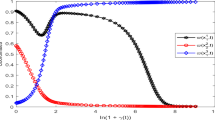Summary.
This paper extends the work of Ray and Vohra [3]. It ascertains which partitions of players will emerge and what actions will these players choose under each partition, when they can sign binding agreements and their actions have externalities. The emphasis, however, is placed on situations with multiple outcomes and how agents behave in the presence of such multiplicity. In particular, a deviating coalition considers all the likely outcomes that may prevail upon its deviation, and selects (if possible) a subset of them. Three augmentations of Ray and Vohra's [3] solution concept are defined, capturing three distinct behavioral assumptions. Efficiency of and the relation between the three notions are discussed.
Similar content being viewed by others
Author information
Authors and Affiliations
Additional information
Received: October 9, 2001; revised version: April 22, 2002
RID="*"
ID="*" I wish to thank Licun Xue, Joseph Greenberg and the participants of PET 2000 for very helpful suggestions. I am indebted to an anonymous referee for his/her valuable comments. The paper has been previously circulated under the title Binding Agreements.
Rights and permissions
About this article
Cite this article
Diamantoudi, E. Equilibrium binding agreements under diverse behavioral assumptions. Econ Theory 22, 431–446 (2003). https://doi.org/10.1007/s00199-002-0301-z
Issue Date:
DOI: https://doi.org/10.1007/s00199-002-0301-z




